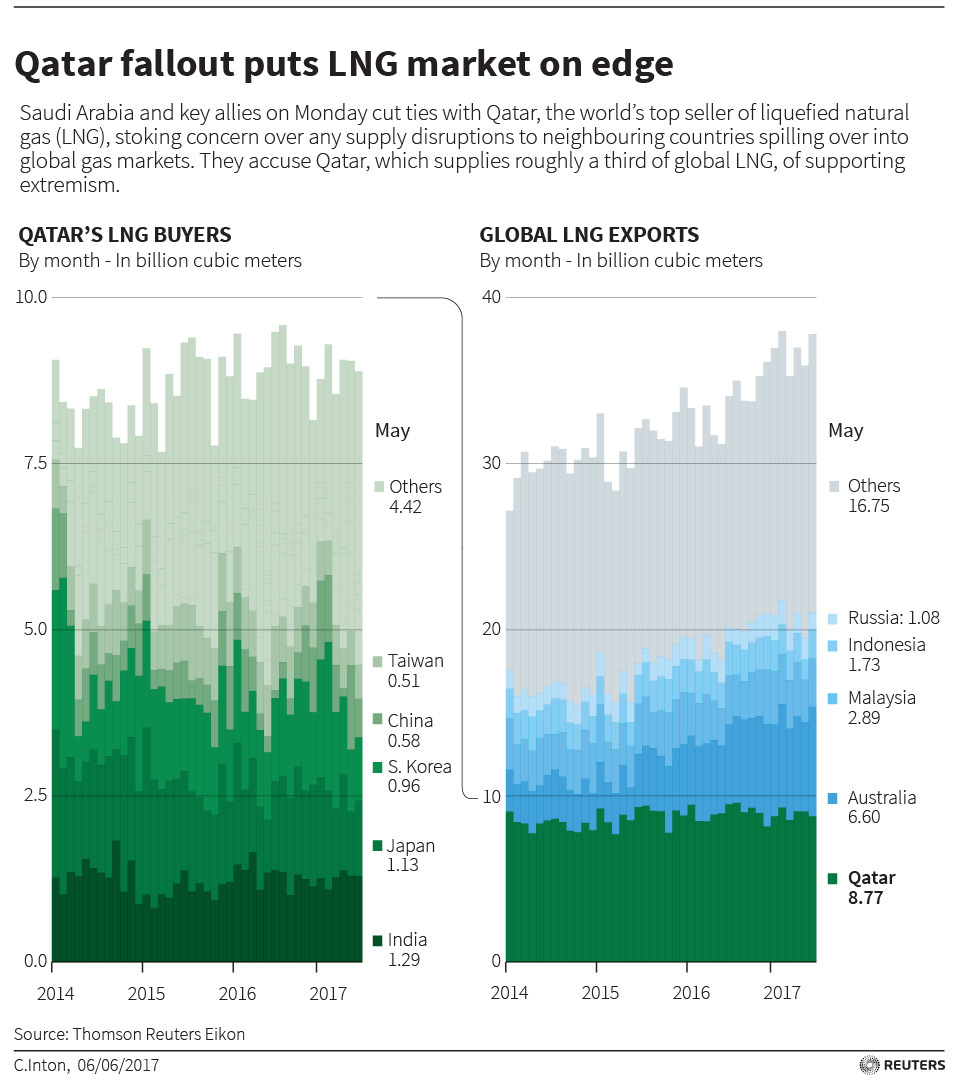
By Tom Finn and Sylvia Westall
DOHA/DUBAI (Reuters) – Kuwait’s ruler will travel to Saudi Arabia on Tuesday, hoping to heal a damaging rift between Qatar and powerful Arab states over the former’ s alleged support of Islamist militants and of political and religious rival Iran.
Emir Sheikh Sabah Al-Ahmad Al-Jaber al-Sabah will meet with Saudi Arabia’s King Salman and seek to resolve the worst infighting among the Arab world’s strongest and richest powers in decades.
Saudi Arabia, Egypt, the United Arab Emirates and Bahrain severed relations with Qatar and closed their airspace to commercial flights on Monday.
In a sign of the potential consequences for the Qatari economy, a number of banks in the region began stepping back from business dealings with Qatar. Saudi Arabia’s central bank advised banks in the kingdom not to trade with Qatari banks in Qatari riyals, sources said.
Oil prices also fell on concern that the rift would undermine efforts by OPEC to tighten production.
Qatar and the other Arab states fell out over Doha’s alleged support for Islamist militants and Shi’ite Iran — charges Qatar has called baseless.
It said, however, that it would not retaliate and hoped Kuwait would help resolve the dispute.
Foreign Minister Sheikh Mohammed bin Abdulrahman al-Thani told Qatar-based Al Jazeera TV that Qatar wants to give Kuwait’s ruler the ability to “proceed and communicate with the parties to the crisis and to try to contain the issue”.
Qatar’s leader, Sheikh Tamim bin Hamad Al-Thani, spoke by telephone overnight with his counterpart in Kuwait and, in order to allow Kuwait to mediate, decided to put off a planned speech to the nation, the foreign minister said.
Qatar has for years parlayed its enormous gas wealth and media influence into a broad influence in the region. But Gulf Arab neighbors and Egypt have long been irked by its maverick stances and support for the Muslim Brotherhood, which they regard as a political enemy.
Yemen, Libya’s eastern-based government and the Maldives – close allies of Qatar’s adversaries in the spat – also cut ties.
The United States, Russia, France, Iran and Turkey have all called for the row to be resolved through dialogue.
BANKS SHUN QATAR, FLIGHTS DIVERTED
Tightening pressure, Saudi Arabia’s aviation authority revoked the license of Qatar Airways and ordered its offices to be closed within 48 hours, a day after the kingdom, the UAE and Bahrain closed their airspace to Qatari commercial flights.
Flight tracker websites showed Qatar Airways flights taking a circuitous route mostly over Iran to avoid their neighbors.
Some Saudi Arabian and UAE commercial banks were also shunning Qatari banks, holding off on letters of credit, banking sources told Reuters on Tuesday.
With an estimated $335 billion of assets in its sovereign wealth fund and its gas exports earning billions of dollars every month, Qatar, however, has enough financial power to protect its banks.
Qatar’s stock market rebounded in early trade on Tuesday after plunging the previous day but the Qatari riyal fell against the U.S. dollar.
Kuwait’s emir, who has spent decades as a diplomat and mediator in regional disputes, hosted Sheikh Tamim last week as the crisis began brewing.
Monday’s decision forbids Saudi, UAE and Bahraini citizens from traveling to Qatar, residing in it or passing through it, instructing their citizens to leave Qatar within 14 days and Qatari nationals were given 14 days to leave those countries.
The measures are more severe than during a previous eight-month rift in 2014, when Saudi Arabia, Bahrain and the UAE withdrew their ambassadors from Doha, again alleging Qatari support for militant groups.
The United Arab Emirates said Qatar needed to carry out specific confidence-building measures and change its behavior.
“After previous experiences with the brother state, we need a frame for the future that will consolidate the security and the stability of the region,” UAE Foreign Minister Anwar Gargash wrote on Twitter overnight.
“We need to rebuild trust after broken pledges, we need a guaranteed roadmap,” he wrote.
But Qatari state TV broadcast images of Sheikh Tamim embracing the Muslim Brotherhood’s spiritual leader Sheikh Youssef al-Qaradawi — whose stay in Doha has for years irked Gulf states – as part of an annual Ramadan reception with Islamic clerics on Monday.
(Reporting by Ahmed Tolba in Cairo, Aziz El Yaakoubi, Tom Arnold, Hadeel Al Sayegh, William Maclean and Celine Aswad in Dubai, Writing by Noah Browning, Editing by Jeremy Gaunt)





